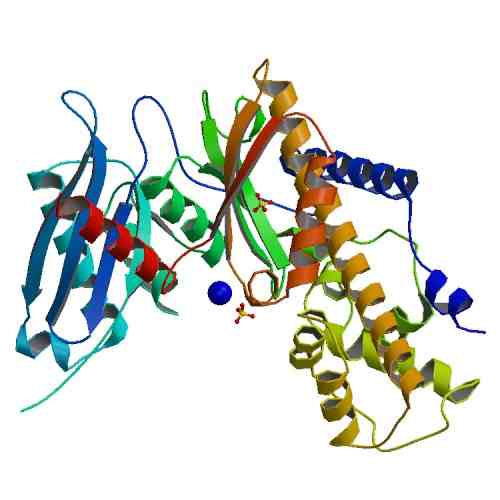Glucokinase: Difference between revisions
Jump to navigation
Jump to search
Created page with "Glucokinase is an enzyme that phosphorylates glucose to become glucose-6-phosphate. It is an isozyme of hexokinase (hexokinase IV) that is present in hepatocytes. Compared to the..." |
Cleaned up the page. |
||
| (6 intermediate revisions by 3 users not shown) | |||
| Line 1: | Line 1: | ||
Glucokinase is an enzyme that phosphorylates glucose to become glucose-6-phosphate. It is an isozyme of hexokinase (hexokinase IV) that is present in hepatocytes. Compared to the other forms of hexokinase, glucokinase has a low affinity for glucose. This means that when glucose levels in the body are low, glucose isn't phosphorylated to become glucose-6-phosphate, and it goes to other tissues that have a greater need for the glucose. Furthermore, glucokinase is not inhibited by the product glucose-6-phosphate. This allows the enzyme to continually phosphorylate glucose, even when the concentration of glucose-6-phosphate is very high<ref>Lehninger, A. L. Nelson, D. L. Cox, M. M. (2000) Principles of Biochemistry, 6th edition, New York: Worth Publishers. Chapter 15, page 578.</ref>. | [[Image:Structure of Glucokinase.jpg|thumb|right|Structure of Glucokinase.jpg]]Glucokinase is an [[Enzyme|enzyme]] that [[Phosphorylation|phosphorylates]] [[Glucose|glucose]] to become [[Glucose-6-phosphate|glucose-6-phosphate]]. It is an [[Isozyme|isozyme]] of [[Hexokinase|hexokinase]] ([[Hexokinase IV|hexokinase IV]]) that is present in [[Hepatocytes|hepatocytes]]. Compared to the other forms of hexokinase, glucokinase has a low affinity for glucose. This means that when glucose levels in the body are low, glucose isn't phosphorylated to become glucose-6-phosphate, and it goes to other tissues that have a greater need for the glucose. Furthermore, glucokinase is not inhibited by the product glucose-6-phosphate. This allows the enzyme to continually phosphorylate glucose, even when the concentration of glucose-6-phosphate is very high<ref>Lehninger, A. L. Nelson, D. L. Cox, M. M. (2000) Principles of Biochemistry, 6th edition, New York: Worth Publishers. Chapter 15, page 578.</ref>. | ||
=== References === | |||
=== | |||
<references /> | <references /> | ||
Latest revision as of 13:28, 6 December 2016

Glucokinase is an enzyme that phosphorylates glucose to become glucose-6-phosphate. It is an isozyme of hexokinase (hexokinase IV) that is present in hepatocytes. Compared to the other forms of hexokinase, glucokinase has a low affinity for glucose. This means that when glucose levels in the body are low, glucose isn't phosphorylated to become glucose-6-phosphate, and it goes to other tissues that have a greater need for the glucose. Furthermore, glucokinase is not inhibited by the product glucose-6-phosphate. This allows the enzyme to continually phosphorylate glucose, even when the concentration of glucose-6-phosphate is very high[1].
References
- ↑ Lehninger, A. L. Nelson, D. L. Cox, M. M. (2000) Principles of Biochemistry, 6th edition, New York: Worth Publishers. Chapter 15, page 578.